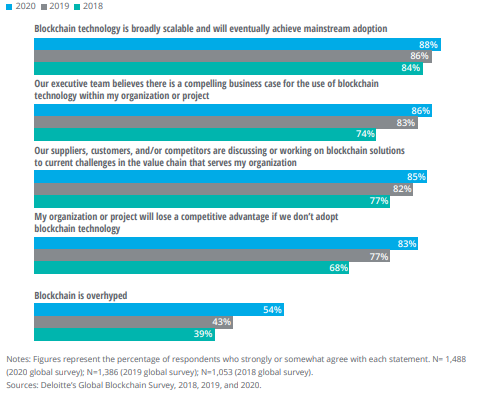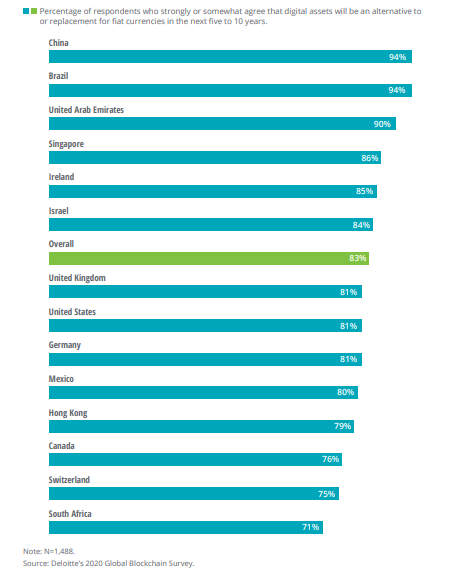China, Brazil Most Likely To Opt For Crypto As Alternative To Fiat

Deloitte’s latest survey suggests that inclination towards the use of blockchain technology as well as cryptocurrencies has witnessed a significant surge over the years. Citizens of China and Brazil consider the replacement of fiat currencies with cryptocurrencies.
Blockchain Tech Garners More Boosters
Blockchain technology has garnered many enthusiasts across the world. Several countries, as well as mainstream companies, have been adopting the technology and are already reaping its benefits. Cryptocurrencies seem to be following suit. Once considered risky, cryptocurrencies have definitely gathered the attention of authorities across the globe over time. Deloitte, one of the “Big Four” accounting platforms recently released a report highlighting the status quo of blockchain tech and cryptocurrencies.
A report named “Deloitte’s 2020 Global Blockchain Survey” was released by the accounting firm recently and was conducted between 6 February to 3 March 2020. A total of 1,488 people were surveyed this year and were asked if they agreed or disagreed with the below statements.

The next question focused on the relevance of blockchain technology to the respondents’ organization and 55 percent suggested that blockchain tech was one of the top five strategic priorities of their company in the next 24 months. Even though it is considered important, 26 percent of them stated that it wasn’t their top five strategic priorities. 14 percent of the respondents suggested that blockchain tech would be relevant to their organization, however, it wasn’t a strategic priority. Only 3 percent exclaimed that they hadn’t come to a conclusion while the remaining 2 percent proposed that it wouldn’t be relevant.
Furthermore, digital assets were also part of the survey. Respondents were asked to choose between a list of digital assets that they would consider using. While 64 percent suggested that they would use enterprise controlled assets, 59 percent suggested that they would use decentralized cryptocurrencies like Bitcoin, Ether, EOS, etc.. 54 percent of the respondents were inclined towards fiat-backed currencies and another 54 percent sided algorithm-driven stablecoins.
Finally, participants were asked if they would replace or choose cryptocurrencies as an alternative to fiat currencies. Respondents from China, Brazil, and United Arab Emirates were seen topping the charts.

The chart evidently suggests that people across the globe would strongly consider using cryptocurrencies as a replacement for fiat currencies.
- Michael Saylor Hints at Another Strategy BTC Buy as Bitcoin Drops Below $68K
- Expert Says Bitcoin Now in ‘Stage 4’ Bear Market Phase, Warns BTC May Hit 35K to 45K Zone
- Bitcoin Price Today As Bulls Defend $65K–$66K Zone Amid Geopolitics and Tariffs Tensions
- XRP Realized Losses Spike to Highest Level Since 2022, Will Price Rally Again?
- Crypto Market Rises as U.S. and Iran Reach Key Agreement On Nuclear Talks
- Shiba Inu Price Feb 2026: Will SHIB Rise Soon?
- Pi Network Price Prediction: How High Can Pi Coin Go?
- Dogecoin Price Prediction Feb 2026: Will DOGE Break $0.20 This month?
- XRP Price Prediction As SBI Introduces Tokenized Bonds With Crypto Rewards
- Ethereum Price Rises After SCOTUS Ruling: Here’s Why a Drop to $1,500 is Possible
- Will Pi Network Price See a Surge After the Mainnet Launch Anniversary?
















